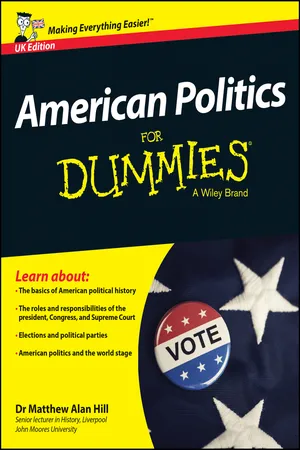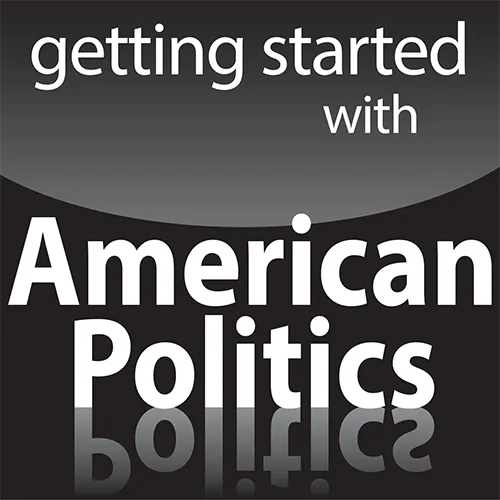Describing the emergence of the new nation
Considering the meaning of democracy
Considering issues in contemporary America
Explaining the emergence of the US on the world stage
The United States isn’t your typical nation; it didn’t emerge from a long process of interactions between a mix of geography and culture, as was the case in Europe. The nation emerged from a fight for liberty – a fight that was based on a new way of dealing with relations between a government and its people. And today, if you look around the globe, you can see how much influence the American concept of government has had. Around half of the nearly 200 countries in the world are democracies, and many of these have emulated the American political system.
This chapter takes you on a sweeping tour of all things American. I identify how America came to be this revered nation by examining its historical and philosophical roots, describe key domestic debates facing the nation today and discuss the role of US involvement on the international stage.
The United States came into being when it publicly declared its independence on 4 July 1776. But that was the culmination of a lot of struggle and growth, and the emergence of the 13 colonies that became the first 13 states of the new nation – and a letter that changed politics for generations to come.
Dear George: The Declaration of Independence
The Declaration of Independence was probably the greatest child-seeking-divorce-from-parents-letter ever to have been written, and one of only a few to have been written by a colony to its former ruler. To cap it off, the declaration of love lost was made public on an international scale.
Written and passed by the Continental Congress (see Chapter 2) on 2 July and published on 4 July 1776, the Declaration starts by explaining that any group wishing to separate from a former ruler needs to provide reasons for doing so. The Declaration begins with the classic sentence, ‘We hold these truths to be self-evident, that all men are created equal, that they are endowed by their Creator with certain unalienable rights, that among these are life, liberty and the pursuit of happiness.’ Of course, the founders’ definition of ‘all men’ really meant White men and not women or other races. Broadening the scope came much later in the life of America, and I discuss part of that struggle in Chapter 14.
The Declaration goes into great length outlining the injuries inflicted by George III, including refusal to pass laws for the common good, restricting justice and economic growth, and the destruction of colonial lives and property by mercenary armies and insurrections. The Declaration then suggests that the colonists have repeatedly pleaded with the British to grant them greater respect but have found their response wanting.
Finally, the colonists declare they are free people by granting themselves absolution ‘from all allegiance to the British Crown’ as a new nation with ‘full power to levy war, conclude peace, contract alliances, establish commerce, and to do all other acts and things which independent states may of right do.’
The backstory: Opposing colonial power
The Declaration arose from an environment of increasing discontent. From the mid-1700s, colonists were frustrated with the British controlling their destiny. Combined with steady population growth – 2 million people by the early 1760s – was a growing economy and a desire among colonists for further territorial expansion. However, colonists were constrained by a series of British Acts, taxes and royal proclamations that fuelled increasing resentment of colonial rule.
The year 1763 was important in signalling the beginning of the end for British colonial America. The Seven Year War (1756–1763) pitting European powers against each other was echoed in North America as the French and Indian War. It was a battle between the French and the British for colonial domination of the region, and the British won. With the defeat of the French, the colonists believed they could thus expand the territory under their control. However, fearful of Native American rebellion in response to such expansionism, in 1763 King George III issued a royal proclamation forbidding it. Siding with the Native Americans, George III declared that colonists on these lands would have to be removed and, adding to the perceived insult, they would have to help pay for the building of military outposts to protect the border they didn’t want.
In the next two years relations between the British colonial powers and the colonists were further inflamed when a series of Acts sought more revenue from the colonies and greater control over their affairs. In 1765, for example, the Stamp Act – used to finance troops based in the colonies – was the first direct tax applied to the colonists. They responded by submitting petitions and boycotting British goods. They also established groups such as the Sons of Liberty, which rebelled against colonial power. Their argument was that without representation in Parliament taxation should not be applied.
By 1767 further Acts had asserted British control over the colonies, and a growing number of colonists were refusing to pay taxes. At one protest against taxes in 1770, British troops killed five people. Referred to as the Boston Massacre, this event became the beacon of resistance against British control. Simultaneously, London relented and repealed all Acts except taxing tea. In December1773, in an incident known as the Boston Tea Party, a group of men dressed as Native Americans raided the East India Company ships docked in Boston and dumped their cargo of tea into the harbour.
Parliament then introduced the Intolerable Acts, severely restricting the powers of the Massachusetts government by placing it under Crown control. In response, the colonists organised themselves and held the First Continental Congress, in Philadelphia in 1774. Twelve of the thirteen colonies sent delegates (Georgia declined), and although disagreements occurred about whether to seek a resolution with Britain or to request legislative parity or separation, they were united in their opposition to Britain’s increasing dominance. The Congress issued a declaration on how it wanted Britain to respond to its grievances, and declared it would meet again the following year if the demands weren’t met. Before it met again, however, British troops had attempted to seize patriot weapons and the revolution began.
The Second Continental Congress met in 1775, organised the Continental Army and established George Washington as its commander. A year later, on 4 July, the Congress published the Declaration of Independence, assumed the functions of government and began appointing ambassadors, signing treaties, raising an army, seeking loans from European lenders and issuing money. The battle of Yorktown in October 1782 signalled the end of the war, with General Washington accepting the surrender of the British general, Cornwallis.
In February 1793 the British declared an end to hostilities and in September signed the Treaty of Paris recognising the United States of America as a new nation. The child was officially divorced from its parents.
How to Be a Democracy: The Manual
Creating a new state brought new issues to be addressed, including what the state would look like, how it would respond to the fear of tyrannical rule, and what type of relationship would be formed between government and the people.
Founding forethoughts
In any new game, the rules of play have to be worked out. And new games don’t appear in isolation from the experiences of the people developing them; they’re driven by those people and experiences. In the case of democracy, the new game developers were also known as the founding fathers and were responding to the grievances of the colonists in the 13 colonies. In the wake of their squabbles with King George III, they feared a tyrannical and absolutist leader who dictated terms and did not listen to the needs or wants of the people. Thus, they drew on Enlightenment political philosophy, otherwise known as liberalism, which was being discussed at the time in Europe.
Liberalism proposed a radical reinterpretation of the r...







